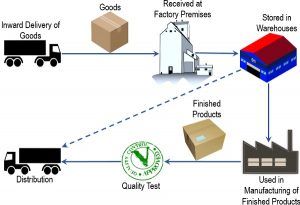

You identify all the merchandise, count it and record totals per item. Stocktaking is when you manually verify the quantity of inventory your business has on hand. Here are six inventory management terms that you’ll want to familiarize yourself with. Getty Images/FG Tradeįor product-based businesses, managing inventory levels is crucial to making your business run smoothly and keeping customers happy. Inventory is an idle resource which is usable to have value.Regardless of what kind of products you sell, keeping track of your inventory is an important part of maintaining a business. The inventory control is mainly concerned with making optimum decisions regarding above variables which are subject to control. Price fluctuation may have a marked effect on the procurement policy of an enterprise or organization, if these fluctuations are to be utilized to advantage of the unit, materials have to be purchased in adequate quantities when prices are lowest.Īll the above reasons or objectives involve cost. (vii) To Utilize to Advantage Price Fluctuations: Input materials and components/parts may be cheaper when purchased in bulk quantities owning to quantity discounts and lower transportation costs/charges. A reserve stock of raw materials is must for smooth manufacturing operations. Sometimes input materials may become scarce and difficult to get when there are large fluctuations in output and demand for them. (v) To Ensure Against Scarcity of Materials in the Market: Depending upon the production requirements stocks are to be maintained and supplied. Market requirements may disturb the manufacturing programme of the enterprise. (iv) To Allow for a Possible Increase in Output if so Required:

The delay in delivery of finished product to the buyer is avoided by holding inventory stock of finished goods. The following points give the importance of inventory to an organization: a person may be tempted to purchase more if inventories are displayed in bulk. (v) Creation of Motivational Effect in Decision Making:Ĭreates motivational effect in decision and policy making e.g. Maintains smooth and efficient production flow thus keeps a process continually operating. (iv) Maintenance of Smooth and Efficient Production Flow: Stocks bring economy so purchase of various inputs due to discounts on bulk purchase. Purchase in desired quantities nullifies the effects of change in prices or supply. (iii) Inventory Provides Production Economies: Further it has been observed that costs of not having inventory (stock out conditions) are usually greater than costs of having them. On the other hand, smooth working of the organization is not possible without inventory so it is a necessity.

The invested capital remains idle till the stocks are not consumed. Inventories require valuable space, capital and other overheads for maintaining it. (ii) Inventory, a Necessary Evil for Any Enterprise: Thus it leads to better utilization men and machines besides economy. Inventories absorb these fluctuations and help in maintaining undisturbed production i.e., we decouple the manufacturing activities from the consumer and vendor successfully by cushions of stocks.įurthermore purchasing/order of raw material can be carried out independently of the finished products distribution and both of these activities can be made low cost operations say by ordering raw material and distributing products in one big lot than in small batches. Against shocks due to demand/supply fluctuations, it separates different manufacturing operations from one another and makes them independent so that each operation can be performed economically.įor example, an organization has to deal with several consumers and vendors and due to their unpredictable behaviour there are always fluctuations in demand or supply of goods which disturbs the schedule of the enterprise.


 0 kommentar(er)
0 kommentar(er)
